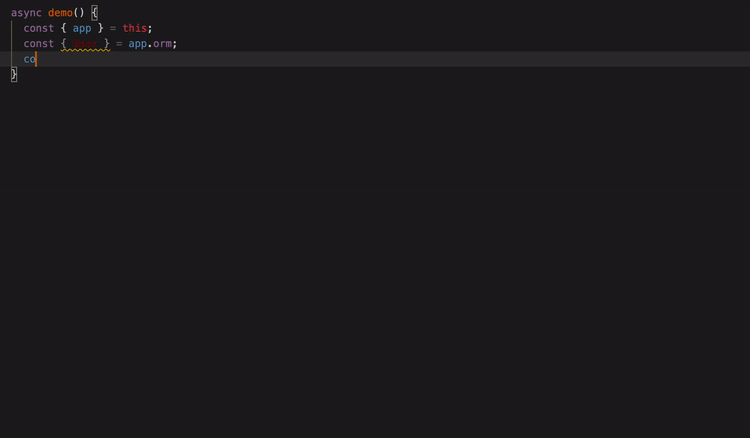2021.10 v1.14
It has been a busy month for Leoric, for there are more than one page of pull requests, which includes some major changes:
- Type casting on query values,
- Fixed compatibility issues found in
model.update()、Model.findAndCountAll()of Sequelize adapter, - More consisting result dispatching, and
- More robust TypeScript declarations.
TypeScript Declarations
Leoric includes a declaration file since v0.x, which is very crude and never tested in actual TypeScript projects. In October we’ve been migrating an internal web application to TypeScript by generating declaration files for the model layer, which in turn made us recognize that there were quite a few mistakes in the d.ts.
Let’s take a look of the coding experience now with the d.ts fixed:

const result = await User.average('age').average('height').group('sex');
// The actual type should be ResultSet<{ age, height, sex }>
// TypeScript currently can only deduce ResultSet<Record<string, Literal>> | number
model.update()
Usually we can update existing model instances with model.update(values). In Sequelize mode, this method is expected to work a bit differently than the default implementation, such as:
- Leoric only updates the values passed in,
- Sequelize on the other hand, will merge all the changes, including the values passed in, then have the merged changes applied once.
Type Casting on Query Values
When querying with models, the passed query values might not have the same type as expected, such as:
User.findOne(ctx.query.id); // '1'
User.findOne({ name: 9527 });
which is equivalent of SQLs like below:
SELECT * FROM users WHERE id = '1';
SELECT * FROM users WHERE name = 9527;
MySQL will have these values casted to expected types when performing the query, hence records like id=1 or name='9527' could be matched. But these kinds of queries have performance issues, in some cases they won’t be mapped to correct index.
Hence in October, we’ve refactored the type casting of attributes to make following queries work better:
User.findOne('name = ?', name);
User.findOne({ name });
User.findOne({ name: { $ne: name });
Date is handled in a bit different way. If some column have specific data types, such as omitting milliseconds or so, then following queries will change accordingly:
// birthday DATEONLY -- keeps only YYYY-MM-DD
User.findOne({ birthday: new Date() });
// SELECT * FROM users WHERE birthday = '2021-11-10';
// created_at DATETIME(0) -- drops milliseconds because format is YYYY-MM-DD hh:mm:dd
User.findOne({ createdAt: new Date() });
// SELECT * FROM users WHERE created_at = '2021-11-10 07:35:00.000';
Result Dispatching
The return type of Model.where() or the Model.findAll() in Sequelize adapter might be one of the following:
- Collection
- ResultSet<Record<string, Literal»
If the query result includes only one aggregated value, the value might be returned directly instead, such as:
const count = await User.count();
const age = await User.average('age');
The complete result dispatching logic is like below:
- If the query contains
GROUP, no matter whether the query result is consisted of existing columns or compound columns, the return type isResultSet. - If the query contains functions in
SELECTcolumns, the return type isResultSet. - If the query contains only one row and only one aggregated column in the row, the value of the column is returned.
- For the rest cases, the return type is
Collection<Bone>.
Following example consists of all the conditions listed above
const users = await User.findAll();
// Collection<User>
const averageHeights = await User.average('height').group('sex');
// ResultSet<{ sex, height }>
const generations = await User.select('DISTINCT YEAR(birthday) AS year');
// ResultSet<{ year }>
The result dispatching strategy is discussed with more detail in 查询结果分发策略
Changelog
Please visit our Releases page to get the whole list of changelog, or check the commits between v1.12.0…v1.14.2 manually at https://github.com/cyjake/leoric/compare/v1.12.0…v1.14.2
v2.x Milestone
v2.x is scheduled to be released in 2022.1.1, which is planned to introduce several breaking changes, such as taming the dangerous realm.sync().